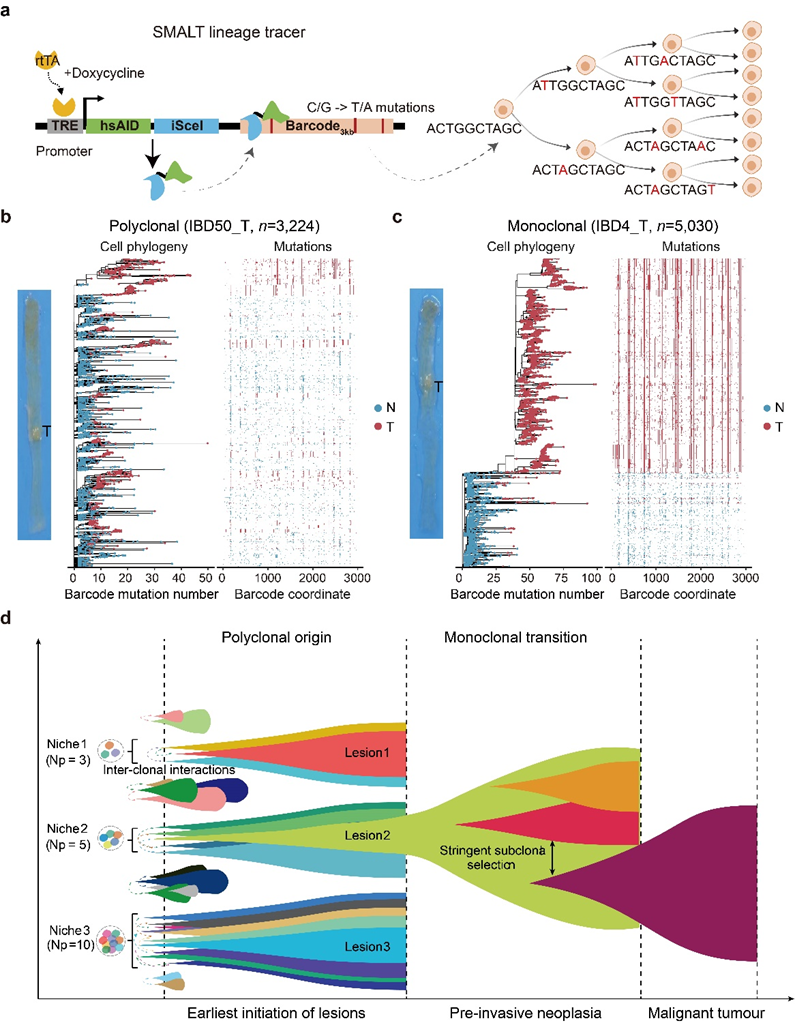New Study Reveals Colorectal Tumors Originate from Multiple Cells
Date:06-11-2024 | 【Print】 【close】
Recently, researchers led by Prof. HU Zheng from the Shenzhen Institutes of Advanced Technology (SIAT) of Chinese Academy of Sciences, along with their collaborators, demonstrated a new model of early evolution in the transition of tumors from polyclonal to monoclonal, and elucidated the mechanisms of intercellular communication and interaction underlying the polyclonal origin of tumors.
The study was published in Nature on Oct. 30.
Colorectal cancer (CRC) is the third most common cancer globally and the second leading cause of cancer-related deaths. Gaining insight into the origins and evolution of precancerous lesions is vital for preventing their progression to malignancy. However, our current understanding remains limited.
According to the classical clonal evolution theory, tumors originate from a single cell that undergoes continuous clonal expansions. However, this study reveals that tumors arise from multiple cells, supporting a polyclonal origin model.
In this study, researchers utilized a base editor-enabled DNA barcoding system to meticulously map the single-cell phylogenies in mouse models of intestinal tumorigenesis, triggered either by inflammation or Apc mutation. By analyzing a staggering 260,922 single cells from normal, inflamed, and neoplastic intestinal tissues, the team uncovered a striking pattern: numerous independent lineages were observed undergoing parallel clonal expansions within individual lesions. This polyclonal origin suggests that colorectal precancers may arise from multiple distinct cellular lineages working cooperatively in the earliest stages of cancer development.
The findings were further corroborated through genomic analyses of human samples. In a study of sporadic colorectal polyps, researchers found that 29% of the samples (30 out of 102) exhibited this polyclonal origin through bulk whole-exome sequencing, while single-gland whole-genome sequencing revealed the same in 60% of cases (3 out of 5). Additionally, their results indicate an evolutionary transition from a polyclonal phase to a monoclonal one, with monoclonal lesions representing a more advanced stage of tumorigenesis.
This study sheds light on the origins and evolution of intestinal precancerous lesions, paving the way for improved strategies to prevent the malignant transformation that can lead to colorectal cancer.

Fig. 1 Single-cell lineage tracing reveals polyclonal-to-monoclonal transition in colorectal precancerous evolution. (Image by SIAT)

Fig. 2 Vibrant peacock feathers illustrate the transition of tumor cells from a polyclonal to a monoclonal state. (Image by SIAT)
Media Contact: LU Qun
Email: qun.lu@siat.ac.cn
Download the attachment:
Polyclonal-to-monoclonal transition in colorectal precancerous evolution